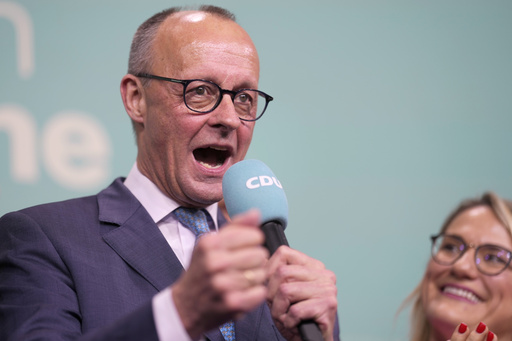In Berlin, Friedrich Merz is poised to take on the role of Germany’s 10th chancellor in the post-World War II era following the recent national elections. He has expressed his commitment to enhancing European unity and addressing the continent’s security challenges, particularly in light of the new administration in the United States and the ongoing conflict in Ukraine.
As Europe faces significant divisions, many leaders appear preoccupied with domestic matters, making it challenging to generate concerted responses to critical issues. Nonetheless, there are substantial expectations for Merz to assume a leadership role and to foster a unified stance on recent U.S. policy changes that threaten the transatlantic partnership. “Every indication we receive from the USA suggests a dwindling interest in Europe and a decreasing enthusiasm for involvement here,” Merz remarked to the press on Monday. He expressed hope that he could persuade American officials of the mutual benefits of maintaining strong transatlantic relations.
Merz’s efforts will be complicated by the necessity of forming a coalition with the Social Democrats, led by outgoing Chancellor Olaf Scholz. He has firmly stated that he will not collaborate with the far-right Alternative for Germany party, despite their notable electoral success. As a leading figure of the center-right Union bloc, which garnered 28.5% of the votes, Merz embraces the ambition of leading the nation towards a more unified Europe.
In his victorous speech, the 69-year-old lawyer acknowledged the significant challenges ahead, stating, “I realize the enormity of the task that lies before us. The world isn’t waiting for our delayed coalition discussions and negotiations.” Despite his extensive political experience, Merz faces the chancellery without having served in a government role prior, making his ascent particularly notable.
Merz’s rivalry with former Chancellor Angela Merkel has been a defining element of his political journey. Although Merkel has commended Merz’s skills as an orator and his ambitions for leadership, she also pointed out that their mutual aspiration to dominate the political landscape complicated their relationship. After the Union’s narrow defeat in the 2002 elections, Merkel consolidated her leadership, sidelining Merz.
Following his departure from active politics in 2009, Merz pursued a legal career and chaired the supervisory board of BlackRock’s German division. His time away from politics included business trips to the United States and China, even as he remained rooted in Germany. “If elected chancellor, Friedrich Merz could be the most internationally oriented leader Germany has seen since the war,” stated Volker Resing, the author of a recent biography on Merz.
Merz returned to politics after Merkel announced she would not pursue another term. Despite facing narrow defeats in early leadership contests, he finally secured his position as the party leader after the center-right faced setbacks in the 2021 election. Resing noted that Merz does not shy away from confrontation, believing that debate can ignite meaningful political change.
Amidst rising tensions in the U.S. and the ongoing conflict in Ukraine, Merz has prioritized restoring Germany’s struggling economy and addressing irregular migration. Following Trump’s return to the White House, he declared his intention to unify Europe in confronting challenges from both the U.S. and Russia. “I recognize the severity of our situation concerning America,” he told supporters, emphasizing that fostering unity in Europe is his primary goal.
Political analyst Wolfgang Merkel pointed out the significant pressures Merz will face, suggesting that while expectations of a single voice from Brussels may be high, diverse interests within the EU will likely lead to a complicated political landscape. “Given the varied political majorities, we shouldn’t anticipate a cohesive EU policy,” he added.
Merz has sharpened his focus on immigration, particularly after a tragic incident involving a migrant in Bavaria. This led him to propose increased border restrictions, which were narrowly supported by votes from the AfD party. Such actions have prompted critics to accuse him of breaking political taboos and have drawn public rebuke from Merkel. Following this, there has been a surge of protests against both Merz’s proposal and the rise of far-right sentiments in the country.
Despite facing backlash, Merz has consistently denied any collaboration with the AfD, reiterating his commitment to not working with them if he ascends to the chancellery. Hailing from a rural region in Germany, Merz’s conservative values reflect his upbringing, emphasizing family and tradition. He has been active in politics since joining the CDU in 1972 and has held various governmental roles since then.
Outside of politics, Merz is an avid pilot who occasionally flies his own small plane from his home in Sauerland to Berlin. This passion for flying remains part of his identity, with many remarking that it highlights his desire for freedom amid the demands of public service. “When he discusses flying, his enthusiasm is palpable,” commented Resing. “He believes that being above the clouds represents true freedom.”


